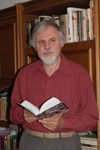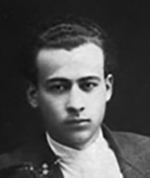By Alex Gordon


HAIFA, Israel — Leonid Solomonovych Pervomaysky, birth name: Illya Shlyomovych Gurevych; 17 May 1908 – 9 December 1973), was a Jewish-Ukrainian poet, a winner of the 1946 Stalin Prize for literature and a member of the Communist party since 1954. Pervomaysky was born in Konstantinograd now Krasnohrad, Kharkov region of Ukraine) to the family of a bookbinder.
The family was in need. Six people lived in one room. The future poet slept on a board on which his mother ironed laundry during the day. Pervomaysky was the child of the Jewish artisanal poverty from the “Pale of Settlement” of the Russian Empire. Pervomaysky’s mother, a seamstress, loved Yiddish songs. He went to a Jewish school, a cheder. Pervomaysky was early addicted to reading; after the October revolution he studied in a gymnasium, then in a labor school. From the age of fifteen he worked at a sugar factory, then as a librarian, director at a youth club, secretary of the editorial office of the district newspaper. Having joined the Komsomol (1924), he broke with the Jewish cultural and linguistic environment, but preferred Ukrainian rather than Russian as his native language.
Jewish themes were constantly present in Pervomaysky’s work. In the early “everyday” stories and novels they occupy a leading place. They were in the center of the story of The Promised Land, the stories The Umbrella of Pinchus-Moti (1926), In the Bookbinder’s Room (1928), From the Song of Songs (1935), and One Night of Ilyusha’s Childhood (1937). Subsequently, the Jewish theme in prose and drama is muted, but Jewish characters are present in the drama Oleksa Dovbush (1940) and in his memoirs. In Pervomaysky’s lyrics Jewish motifs are more rare, but in a number of poems the poet speaks of his origins (Egishe Charentsu, 1935) or varies the themes of Yiddish song folklore (the cycle Shtetl Ladenu, 1928-31). The deeply lyrical image of the poet’s mother with her songs appears on the pages of his poetic diary, excerpts from which under the title Creative everyday life were published in a separate edition in 1967.
Many of Pervomaysky’s works were a resounding success, translated and republished many times; multi-volume collections of his works were published four times in Ukrainian. One of Pervomaysky’s most popular plays, Shtetl Ladenu, staged on many stages, including the best Ukrainian theater, Berezil, was not included in either the three-volume collection of his works (1958-59) or the seven-volume collection (1968-70).
During 1941-1945, he was a military reporter on the fronts of the German-Soviet war.
In 1949, Pervomaysky, along with other Ukrainian Jewish writers, including my father, was subjected to severe harassment with accusations of “rootless cosmopolitanism” “bourgeois nationalism” (in particular, that his work was noticeably influenced by the Hebrew poet Chaim Nahman Bialik, whom the authorities called “a mystic poet” and “reactionary.”).
Secretary of the Board of the Union of Soviet Writers of Ukraine Lubomyr Dmyterko, who called my father an “active cosmopolitan,” sharply criticized the speech of Pervomaysky, who defended himself against the accusations against him: “Here Pervomaysky gives a complete theory of cosmopolitanism. It turns out that Shevchenko [poet, founder of Ukrainian literature.] with his irreconcilability to enemies and love for his people was limited; Ivan Franko [Ukrainian poet and writer], whose favorite was allegedly Heine [and it is now insulting to the memory of Franko to love such a “rootless cosmopolitan” as Heine!], expanded “world understanding,” and Lesya Ukrainka (Ukrainian poet] led Ukrainian literature to “universal humanity.” This is complete cosmopolitanism. […] Pervomaysky developed rotten, cosmopolitan theories, sliding into the swamp of bourgeois humanism.” Pervomaysky was one of the best experts in the Ukrainian language. During the “cosmopolitan campaign,” he fully experienced how difficult it was to be a Ukrainian writer of Jewish origin.
Pervomaysky translated into Ukrainian folklore ballads of more than 40 nations (including Jewish ones), poems of poets of many countries (the closest to him were German poet Heinrich Heine, Russian poet Mikhail Lermontov and Hungarian poet Sándor Petőfi, who changed his native Slovak language to Hungarian and became the best poet of Hungary).
Pervomaysky used elements of the stylistics of the poetic pages of the Bible in the story From the Song of Songs and – especially expressively – in the poem Epiphany, where the influence of the book of the prophet Isaiah is noticeable. He was devoted to the Jewish theme and poems Alonso the Good (in memory of the poet of Jewish origin Mikhail Svetlov), Spinoza, Majdanek, In Babi Yar. With the greatest poetic force, the tragedy of the Shoah is reflected in the poem Stronger than Death (1954) with the use of the stylistics of the Song of Songs and reminiscence Strong as death, love (Song 8:6).
Pervomaysky’s books have been translated into Russian, German, Hungarian, and Belarusian. A collection of his poems in Yiddish translation edited by Isaac Fefer, Mein Freilehe yugnt (My Merry Youth), was published in 1934. I became the first translator of Pervomaysky into English. The Canadian magazine Jewish Fiction published my translation of his story “Schönbrunn.” [Schönbrunn by Leonid Solomonovich Pervomaysky, Jewish Fiction, Issue #37, Translated from Ukrainian by Alex Gordon, 2024.]
*
Alex Gordon is professor emeritus of physics at the University of Haifa and at Oranim, the academic college of education, and the author of 10 books.